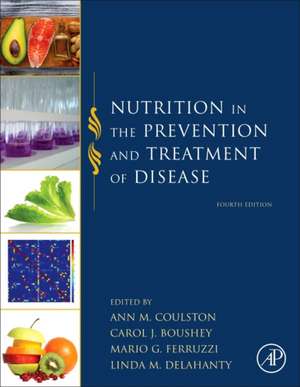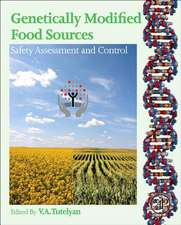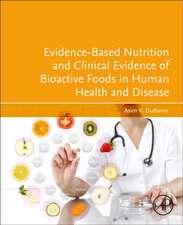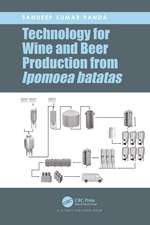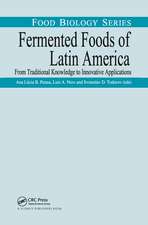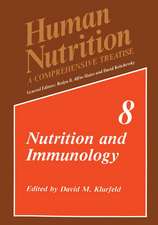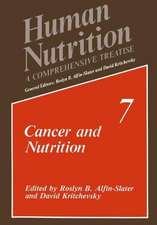Nutrition in the Prevention and Treatment of Disease
Editat de Ann M. Coulston, Carol J. Boushey, Mario Ferruzzi, Linda Delahantyen Limba Engleză Hardback – 28 apr 2017
Generating and analyzing data that summarize dietary intake and its association with disease are valuable tasks in treating disease and developing disease prevention strategies. Well-founded medical nutrition therapies can minimize disease development and related complications. Providing scientifically sound, creative, and effective nutrition interventions is both challenging and rewarding.
- Two new chapters on metabolomics and translational research, which have come to be used in nutrition research in recent years. The new areas of study are discussed with the perspective that the application of the scientific method is by definition an evolutionary process.
- A new chapter on Genetics and Diabetes which reviews the latest research on causal genetic variants and biological mechanisms responsible for the disease, and explores potential interactions with environmental factors such as diet and lifestyle.
- Includes all major "omics" – the exposome, metabolomics, genomics, and the gut microbiome.
- Expands the microbiota portions to reflect complexity of diet on gut microbial ecology, metabolism and health
Preț: 604.42 lei
Preț vechi: 834.48 lei
-28% Nou
Puncte Express: 907
Preț estimativ în valută:
115.69€ • 125.71$ • 97.24£
115.69€ • 125.71$ • 97.24£
Carte tipărită la comandă
Livrare economică 14-28 aprilie
Preluare comenzi: 021 569.72.76
Specificații
ISBN-13: 9780128029282
ISBN-10: 0128029285
Pagini: 1072
Dimensiuni: 216 x 276 x 56 mm
Greutate: 3.31 kg
Ediția:4
Editura: ELSEVIER SCIENCE
ISBN-10: 0128029285
Pagini: 1072
Dimensiuni: 216 x 276 x 56 mm
Greutate: 3.31 kg
Ediția:4
Editura: ELSEVIER SCIENCE
Cuprins
Section I: Research Methodology
Part A: Assessment Methods for Research and Practice
1. Dietary Assessment Methodology
2. Assessment of Dietary Supplement Use
3. Physical and Clinical Assessment of Nutritional Status
4. Energy Requirement Methodology
5. Metabolomics
Part B: Research and Applied Methods for Observational and Intervention Studies
6. Translational Research: Concepts and Methods in Dissemination and Implementation Research
7. Overview of Nutritional Epidemiology
8. Analysis, Presentation, and Interpretation of Dietary Data
9. Current Theoretical Bases for Nutrition Intervention and Their Uses
10. Nutrition Intervention: Lessons From Clinical Trials
11. Biomarkers and Their Use in Nutrition Intervention
Section II: Nutrition for Health Maintenance, Prevention, and Disease-Specific Treatment
Part A: Food and Nutrient Intake for Health
12. Nutrition Guidelines to Promote and Maintain Health
13. Nutritional Recommendations for Athletes
14. Nutrition for Children With Special Health Care Needs
Part B: Dietary Bioactive Compounds for Health
15. Bioavailability and Metabolism of Bioactive Compounds From Foods
16. Antioxidants in Health and Disease
17. Choline and Brain Development
18. Dietary Phytochemicals in Neurodegenerative Disease
19. Diet and Supplements in the Prevention and Treatment of Eye Diseases
20. Phytochemicals in the Prevention and Treatment of Obesity and Its Related Cancers
Part C: Overweight and Obesity
21. Genetics of Nonsyndromic Human Obesity, With Suggestions for New Studies From Work in Mouse Models
22. Obesity: Overview of Medical Treatments and Interventions
23. Surgery for Severe Obesity
24. Behavioral Risk Factors for Overweight and Obesity: Diet and Physical Activity
25. Snacking and Energy Balance in Humans
Part D: Cardiovascular Disease
26. Genetic Influences on Blood Lipids and Cardiovascular Disease Risk
27. The Role of Diet in the Prevention and Treatment of Cardiovascular Disease
28. Nutrition, Lifestyle, and Hypertension
Part E: Diabetes Mellitus
29. Genetics and Diabetes
30. Obesity and the Risk for Type 2 Diabetes
31. The Role of Diet in the Prevention and Treatment of Diabetes
32. Nutritional Management for Gestational Diabetes
Part F: Cancer
33. Interaction of Genetic Factors With Nutrition in Cancer
34. Nutrition and Cancers of the Breast, Endometrium, and Ovary
35. Nutrition and Prostate Cancer
36. Nutrition and Colon Cancer
Part G: Gastrointestinal Health and Disease
37. Intestinal Microbiota and Diet in Health
38. Gut Microbial Metabolism in Health and Disease
39. Nutritional Management of Inflammatory Bowel Disease and Short Bowel Syndrome
40. Nutrient Considerations in Lactose Intolerance
41. Nutritional Considerations in the Management of Gluten-Related Disorders
42. Nutrition and Cystic Fibrosis
Part H: Bone Health and Disease
43. Current Understanding of Vitamin D Metabolism, Nutritional Status, and Role in Disease Prevention
44. Osteoporosis: The Early Years
45. Osteoporosis in Adults
Part A: Assessment Methods for Research and Practice
1. Dietary Assessment Methodology
2. Assessment of Dietary Supplement Use
3. Physical and Clinical Assessment of Nutritional Status
4. Energy Requirement Methodology
5. Metabolomics
Part B: Research and Applied Methods for Observational and Intervention Studies
6. Translational Research: Concepts and Methods in Dissemination and Implementation Research
7. Overview of Nutritional Epidemiology
8. Analysis, Presentation, and Interpretation of Dietary Data
9. Current Theoretical Bases for Nutrition Intervention and Their Uses
10. Nutrition Intervention: Lessons From Clinical Trials
11. Biomarkers and Their Use in Nutrition Intervention
Section II: Nutrition for Health Maintenance, Prevention, and Disease-Specific Treatment
Part A: Food and Nutrient Intake for Health
12. Nutrition Guidelines to Promote and Maintain Health
13. Nutritional Recommendations for Athletes
14. Nutrition for Children With Special Health Care Needs
Part B: Dietary Bioactive Compounds for Health
15. Bioavailability and Metabolism of Bioactive Compounds From Foods
16. Antioxidants in Health and Disease
17. Choline and Brain Development
18. Dietary Phytochemicals in Neurodegenerative Disease
19. Diet and Supplements in the Prevention and Treatment of Eye Diseases
20. Phytochemicals in the Prevention and Treatment of Obesity and Its Related Cancers
Part C: Overweight and Obesity
21. Genetics of Nonsyndromic Human Obesity, With Suggestions for New Studies From Work in Mouse Models
22. Obesity: Overview of Medical Treatments and Interventions
23. Surgery for Severe Obesity
24. Behavioral Risk Factors for Overweight and Obesity: Diet and Physical Activity
25. Snacking and Energy Balance in Humans
Part D: Cardiovascular Disease
26. Genetic Influences on Blood Lipids and Cardiovascular Disease Risk
27. The Role of Diet in the Prevention and Treatment of Cardiovascular Disease
28. Nutrition, Lifestyle, and Hypertension
Part E: Diabetes Mellitus
29. Genetics and Diabetes
30. Obesity and the Risk for Type 2 Diabetes
31. The Role of Diet in the Prevention and Treatment of Diabetes
32. Nutritional Management for Gestational Diabetes
Part F: Cancer
33. Interaction of Genetic Factors With Nutrition in Cancer
34. Nutrition and Cancers of the Breast, Endometrium, and Ovary
35. Nutrition and Prostate Cancer
36. Nutrition and Colon Cancer
Part G: Gastrointestinal Health and Disease
37. Intestinal Microbiota and Diet in Health
38. Gut Microbial Metabolism in Health and Disease
39. Nutritional Management of Inflammatory Bowel Disease and Short Bowel Syndrome
40. Nutrient Considerations in Lactose Intolerance
41. Nutritional Considerations in the Management of Gluten-Related Disorders
42. Nutrition and Cystic Fibrosis
Part H: Bone Health and Disease
43. Current Understanding of Vitamin D Metabolism, Nutritional Status, and Role in Disease Prevention
44. Osteoporosis: The Early Years
45. Osteoporosis in Adults
